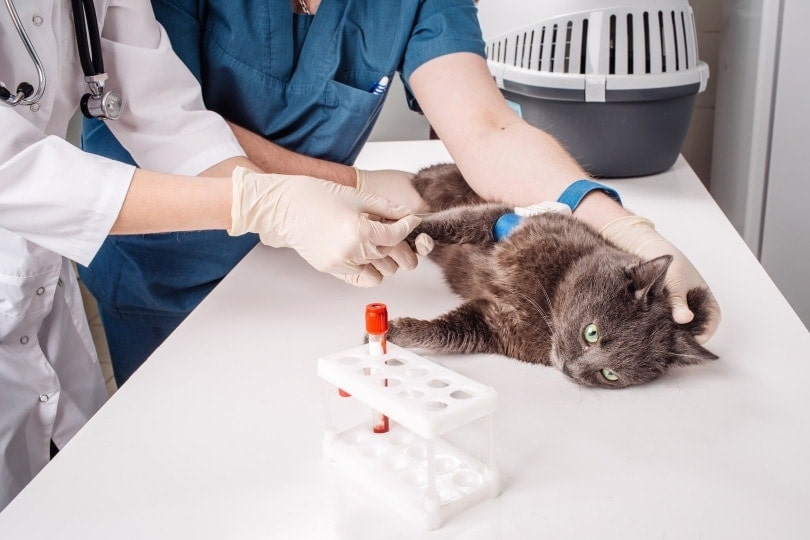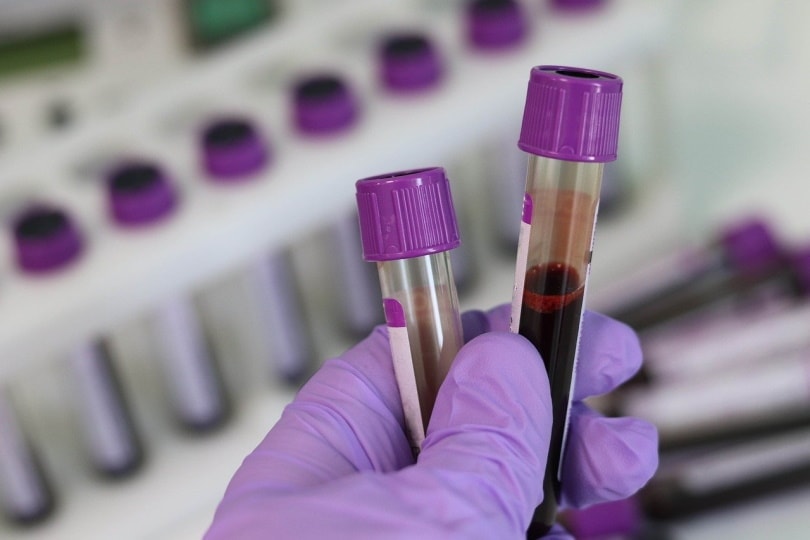Cat Blood Test Normal Values: Test Results Explained (Vet Reviewed)
Updated on

If your cat has recently gotten a blood test, you’re probably worried about the possible results. While your vet will go over the results with you, being able to understand them at least a bit can offer peace of mind.
Whenever your feline gets sick, it isn’t odd for your vet to request a blood test. This workup can tell your vet a great deal about your cat and rule out many different diseases. If something seems off, it can be the first step to a diagnosis.
When Do Cats Need Bloodwork?
Several occurrences may lead to your vet ordering bloodwork. Anytime your cat seems sick without an apparent cause, your vet is likely to order a test. Blood tests look at many different parameters simultaneously, enabling your vet to rule out and confirm various conditions with one sample. Some vets may also order bloodwork when your cat first becomes a patient. Even if your cat is completely fine, this provides a vital baseline for your feline. When they get sick later, your vet will know what their blood results usually look like for comparison.
Routine blood tests can also check for underlying conditions that may otherwise go unnoticed. For this reason, your vet may order annual blood tests every time you see them. Older cats are more likely to need bloodwork, as age often leads to the development of certain diseases.
If your feline is undergoing surgery, a blood test may be required to determine the functioning of the organs before the surgery can be performed. This bloodwork is for precaution only and is used to determine surgical risk.
Most veterinarians have in-house laboratories that allow them to quickly read bloodwork. Most basic bloodwork is done in-house.

Types of Cat Bloodwork
Several different blood tests may be ordered. Not all are the same, so they cannot all be read the same way. Sometimes, your cat may get a simple positive/negative result. Other times, the test may check for many different parameters.
Here is a list of the most common blood tests for felines:
- Feline Leukemia: Most cats are tested for this condition anytime they visit the vet for the first time, especially if they have unknown origins. This virus is extremely contagious, can jump between species, and is life-threatening. Therefore, it is always best to have a diagnosis early. This test is a simple positive/negative. Either the cat has feline leukemia or they don’t.
- Blood Serum: This test involves analyzing the cat’s serum specifically, which enables your vet to evaluate organ function and hormone levels. Often, this test will be performed routinely with older cats to check on their organ function and overall health. They may also be used to diagnose certain conditions.
- Total Thyroid Level: If the cat is thought to have hyperthyroidism, this test checks for elevated or diminished thyroid hormones.
- Complete Blood Count (CBC): If you receive a paper with multiple metrics on it, it is likely that your cat got a CBC. This sort of test checks for many different things in your cat’s blood. If your vet can’t figure out what is wrong with your cat, they’ll likely order this blood test as a next step. The CBC examines your cat’s blood cell components, checking for various parameters in your cat’s red formula. It is often used to determine illnesses, such as anemia, and hydration status. By analyzing your cat’s white blood cell population, the vet can also determine if there is an active infection or an issue with the immune system. The CBC provides your vet with a great deal of valuable information.
How Vets Read Blood Tests
If your cat received a CBC, there are many different metrics being tested. During this blood test, multiple parameters and chemicals in the blood are analyzed. Their results can either be normal or abnormal. Abnormal doesn’t necessarily mean something is wrong, since environmental conditions can artificially change blood levels.
Here is what most blood tests look at:
- White Blood Count: Usually, this count is increased if your feline is sick. Being too low can also indicate certain diseases.
- Red Blood Cell Count: While this count isn’t used to determine disease diagnosis, it can be used to determine dehydration or anemia.
- Hemoglobin: This metric is often used alongside other measurements to determine if the cat has anemia and if so, what kind.
- Hematocrit: This is a measurement of the cat’s red blood cells. Usually, it is used to determine if the cat is anemic or dehydrated. It can also be used to determine certain illnesses.
- Platelet Count: This value is used to determine the blood’s ability to clot.
- Neutrophils: These are a specific type of white blood count. Any unusual sign can indicate inflammation, infection, and other diseases.
- Lymphocytes: This is another type of white blood cell. Changes can indicate certain diseases.
- Glucose (GLU): This is your cat’s “blood sugar.” It is mostly used to diagnose diabetes. However, the values can shift slightly with stress.
- Serum Urea Nitrogen: This indicates kidney function. An increased level can indicate kidney disease, though urethral obstruction and dehydration are also associated with increased levels.
- Serum Creatinine: This also indicates kidney function. However, just like the previous value, it can also be raised due to dehydration.
- Uric Acid: This sometimes appears on blood tests but is not linked to any condition in cats
- ALT: If this is raised, it can indicate liver damage. However, it does not indicate a cause.
- Total Bilirubin: Bilirubin is supposed to be filtered by the liver. If it is raised, the liver is not doing its job correctly. It can indicate various liver problems.
- Direct Bilirubin: This is simply another bilirubin test that helps better diagnose the cause or location of liver issues.
- Alkaline Phosphatase: Sometimes, elevated amounts can indicate liver damage. However, higher levels are often normal in kittens.
- Lactic Dehydrogenase: This is a nonspecific indicator of cell destruction.
- AST: While this parameter is not that specific, it can indicate liver, heart, or muscle damage.
- Bun/Creat Ratio: This indicator is a calculation using other parameters. It is used to determine if other kidney indicators are the result of kidney disease or dehydration.
- Cholesterol: Cholesterol in cats is used to diagnose hypothyroidism, liver disease, diabetes, and Cushing disease. This is not a factor of heart disease, as it is for humans.
- Calcium: This metric can indicate many different diseases. For instance, it can be a sign of kidney disease, tumors, and parathyroidism.
- Phosphorus: Elevations of this metric can point toward kidney disease, bleeding disorders, and hyperthyroidism.
- Sodium: As an electrolyte, it can help indicate hydration status, and low balances can result from vomiting and diarrhea. However, other diseases can also be indicated.
- Potassium: This is another electrolyte that can point to kidney disease if it is too low. Increased levels may indicate Addison’s disease, dehydration, or urethral obstruction. High levels indicate that the cat can be at risk of cardiac issues.
- Chloride: This electrolyte is often lost through vomiting and with Addison’s disease. Higher levels can indicate dehydration.
- Serum Protein: This can indicate hydration status and provide information about infections or the status of the liver or kidneys.
- Serum Albumin: This protein is used to indicate hydration status and issues with the liver and/or kidneys. It may also indicate a hemorrhage.
- Globulin: This specific blood protein usually increases with inflammation and chronic diseases.
Final Thoughts
Anytime your cat gets bloodwork, it can be a bit stressful. However, bloodwork is one of the best ways to determine the cat’s illness and any underlying problems. If it isn’t obvious what is wrong with your feline through a physical examination, your vet will likely order a blood test. Remember, cats cannot describe what they feel, so the information that a blood test provides is incredibly valuable for the vet.
However, blood tests don’t necessarily always lead to a diagnosis. Multiple metrics can indicate different things, so it’s up to your vet to figure out what the tests indicate about your cat’s body and health.
Featured Image Credit: PRESSLAB, Shutterstock













